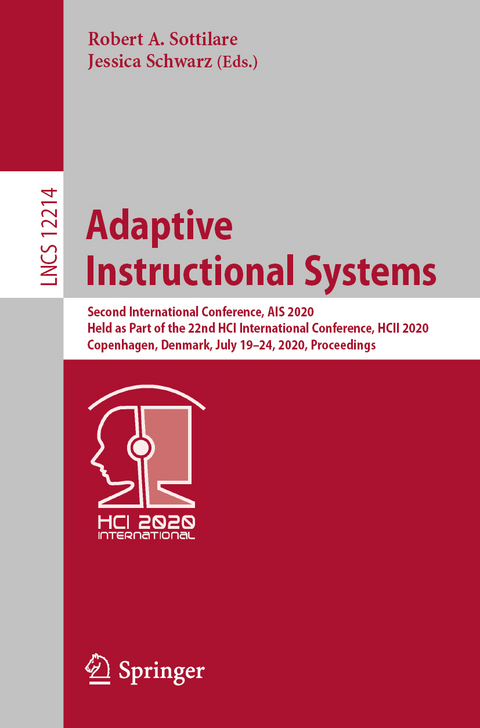
Adaptive Instructional Systems
Springer International Publishing (Verlag)
978-3-030-50787-9 (ISBN)
A total of 1439 papers and 238 posters have been accepted for publication in the HCII 2020 proceedings from a total of 6326 submissions.
The 41 papers presented in this volume were organized in topical sections as follows: designing and developing adaptive instructional systems; learner modelling and methods of adaptation; evaluating the effectiveness of adaptive instructional systems.
Chapter "Exploring Video Engagement in an Intelligent Tutoring System" is available open access under a Creative Commons Attribution 4.0 International License via link.springer.com.
Chapters "An Ambient and Pervasive PersonalizedLearning Ecosystem: "Smart Learning" in the Age of the Internet of Things" and "Exploring Video Engagement in an Intelligent Tutoring System" are available open access under a Creative Commons Attribution 4.0 International License via link.springer.com.
Designing and Developing Adaptive Instructional Systems.- Sensor-based Adaptive Instructional Systems in Live Simulation Training.- An Ambient & Pervasive Personalized Learning Ecosystem: "Smart Learning" in the Age of the Internet of Things.- Bridging Conceptual Models and Architectural Interchange for Adaptive Instructional Systems.- Dewey's Ethics of Moral Principles and Deliberation: Extending IEEE's Ethics Initiative for Adaptive Instructional Systems.- Realistic and Relevant Role-Players for Experiential Learning.- Learning Traces, Measurement and Assessment Templates for AIS Interoperability.- Supporting different Roles and Responsibilities in Developing and Using Context-based Adaptive Personalized Collaboration Environments Compliant to the Law.- Experiential Instruction of Metacognitive Strategies.- Falling Forward: Lessons Learned from Real-Life Implementation of Adaptive Learning Solutions.- Usability Dimensions of Simulated Trainers for Buried Explosives.- Toward Zero Authoring: Considering How to Maximize Courseware Quality and Affordability Simultaneously.- Agent-Based Methods in Support of Adaptive Instructional Decisions.- Representing Functional Relationships of Adaptive Instructional Systems in a Conceptual Model.- Knowledge-to-Information Translation Training (KITT): An Adaptive Approach to Explainable Artificial Intelligence.- User Rights and Adaptive A/IS - From Passive Interaction to Real Empowerment.- Supporting Metacognitive Learning Strategies through an Adaptive Application.- Towards Iteration by Design: An Interaction Design Concept for Safety Critical Systems.- Learner Modelling and Methods of Adaptation.- Bayesian Student Modelling in the AC&NL Tutor.- Nature at Your Service - Nature Inspired Representations Combined with Eye-gaze Features to Infer User Attention and Provide Contextualized Support.- Adapting Instruction by Measuring Engagement with Machine Learning in Virtual Reality Training.- Realizing the Promise of AI-Powered, Adaptive, Automated, Instant Feedback on Writing for Students in Grade 3-8 with an IEP.- Declarative Knowledge Extraction in the AC&NL Tutor.- On the Importance of Adaptive Operator Training in Human-Swarm Interaction.- The Mental Machine: Classifying Mental Workload State from Unobtrusive Heart Rate- measures Using Machine Learning.- Production Implementation of Recurrent Neural Networks in Adaptive Instructional Systems.- Pilot State Monitoring for Cursus Recommendation.- Experimental Evaluation of Heart-based Workload Measures as Related to Their Suitability for Real-time Applications.- EEG Covariance-based Estimation of Cooperative States in Teammates.- Adapting the Zone of Proximal Development to the Wicked Environments of Professional Practice.- An Adaptive Instructional System for the Retention of Complex Skills.- Learner Modeling in the Context of Caring Assessments.- Evaluating the Effectiveness of Adaptive Instructional Systems.- The Evolving Assessment Landscape and Adaptive Instructional Systems: Moving Beyond Good Intentions.- Contextual Barriers to Validity in Adaptive Instruction and Assessment.- Does Time Matter in Learning? A Computer Simulation of Carroll's Model of Learning.- Competency Development through Experiential Training: Mapping Scenarios with Assessments.- Does Gamification Work? Analyzing Effects of Game Features on Learning in an Adaptive Scenario-Based Trainer.- From "Knowing What" to "Knowing When": Exploring a Concept of Situation Awareness Synchrony for Evaluating SA Dynamics in Teams.- Exploring Video Engagement in an Intelligent Tutoring System.- Using a Non-Player Character to Improve Training Outcomes for Submarine Electronic Warfare Operators.- The Impact of Adaptive Activities in Acrobatiq Courseware: Investigating the Efficacy of Formative Adaptive Activities on Learning Estimates and Summative Assessment Scores.- A Mastery Approach to Flashcard-based Adaptive Training.
| Erscheinungsdatum | 06.07.2020 |
|---|---|
| Reihe/Serie | Information Systems and Applications, incl. Internet/Web, and HCI | Lecture Notes in Computer Science |
| Zusatzinfo | XV, 570 p. 139 illus., 91 illus. in color. |
| Verlagsort | Cham |
| Sprache | englisch |
| Maße | 155 x 235 mm |
| Gewicht | 896 g |
| Themenwelt | Mathematik / Informatik ► Informatik ► Betriebssysteme / Server |
| Informatik ► Software Entwicklung ► User Interfaces (HCI) | |
| Schlagworte | Applications • Artificial Intelligence • Computer aided instruction • Computer Hardware • Computer Networks • Computer Science • Computer systems • conference proceedings • Data Security • E-Learning • Human-Computer Interaction (HCI) • Informatics • Information Retrieval • information systems • Learning Environments • machine learning • Recommender Systems • Research • Robotics • sensors • Signal Processing • Software engineering • Telecommunication networks • User Interfaces • wireless telecommunication systems |
| ISBN-10 | 3-030-50787-4 / 3030507874 |
| ISBN-13 | 978-3-030-50787-9 / 9783030507879 |
| Zustand | Neuware |
| Haben Sie eine Frage zum Produkt? |
aus dem Bereich


